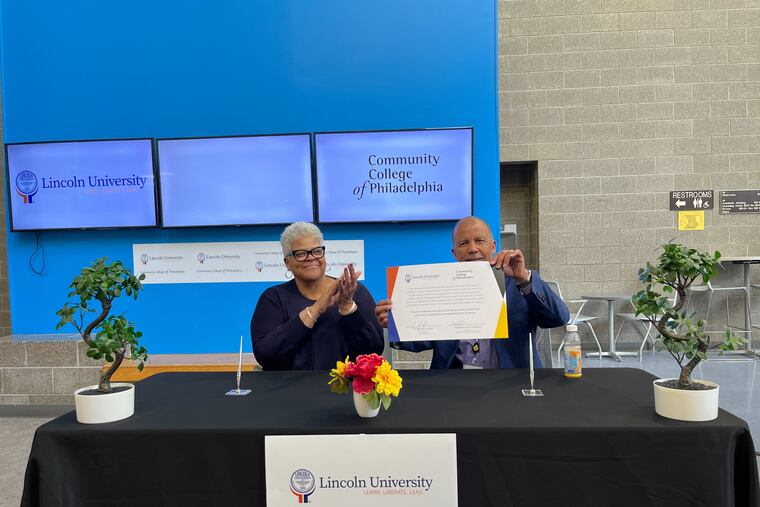Lincoln University grads now have a new path to nursing careers after the HBCU’s nursing program closed last spring
The agreement creates a path for Lincoln grads to complete a nursing degree in four semesters at the Community College of Philadelphia.

Lincoln University students pursuing a career in nursing can advance after graduation to a 15-month program at the Community College of Philadelphia through a new partnership between the institutions.
Lincoln, a historically Black university in Chester County, shut down its nursing program last spring due to poor performance by its graduates on the licensing exam for registered nurses. Lincoln was the only HBCU with a nursing program in Pennsylvania.
» READ MORE: Lincoln University closes its nursing program, leaving a hole in the pipeline of Black nurses
A new agreement signed Monday provides Lincoln students with a new route to a nursing career. Lincoln students interested in nursing will complete their science requirement and one math course as part of their four-year bachelor’s degree.
Upon graduating, they will matriculate to CCP, where they will be able to obtain an associate’s degree in the science of nursing in four additional semesters. The degree qualifies graduates to take the registered nurses’ licensure exam, or NCLEX.
CCP offers a number of health-related professional programs at its main campus on Spring Garden Street in Philadelphia, including nursing courses for first-time students and those who already completed a four-year degree.
Both schools will offer advising to students throughout the process.
Lincoln president Brenda Allen compared the partnership to the traditional path toward medical school. Students get the necessary background in college, and complete their professional training after graduation.
“We’ve done that in premed for 170 years,” Allen said at a signing ceremony at the community college. “Why not think about nursing as also a preprogram?”
Of the nearly 130 CCP nursing graduates who took the licensure exam last year, 87% passed in their first attempt, according to the Pennsylvania State Board of Nursing, which regulates nursing programs.
Diversity and affordability
Last year’s loss of the Lincoln nursing program left a gap in the pipeline of Black nurses, and the new agreement is an effort to fill it.
The partnership builds on a longstanding affinity between Lincoln and CCP, which is also a predominantly Black institution, said Donald Guy Generals, CCP’s president.
“We are not an HBCU, but we are kind of kissing cousins,” Generals said jokingly of his institution.
The accelerated nursing program’s affordability appealed to Gaza Tumaini, a Lincoln graduate who is now completing an accelerated associate’s degree in nursing at CCP.
» READ MORE: ‘A key role in the health of the city’: Community College of Philadelphia celebrates its nursing scholars
Tumaini planned to complete the nursing program at Lincoln, but changed majors because the program struggled. Upon graduation, he matriculated at CCP on his own, without the formal partnership. The path represented the most affordable way to fulfill his dream of a career in nursing.
The partnership between the institutions will help future students save on tuition expenses by allowing them to take most requirements toward their college degree at Lincoln, and then pay for only four extra nursing classes at CCP.
“This agreement will give other compassionate students of color an opportunity to become nurses without taking even more massive amounts of debt,” Tumaini said.